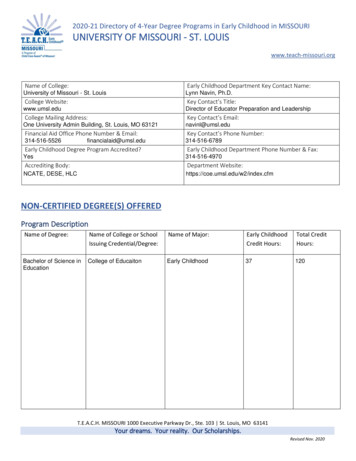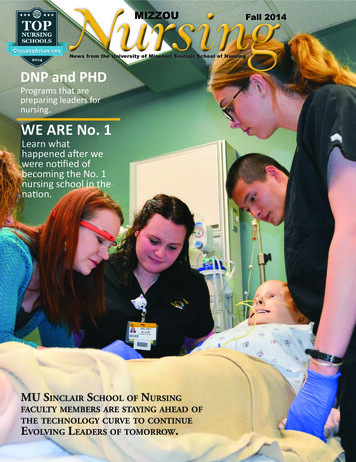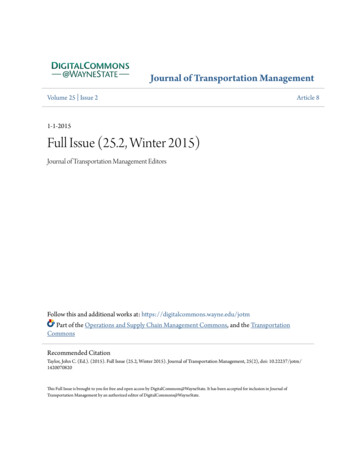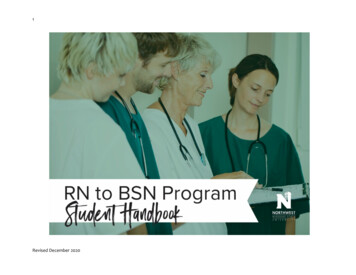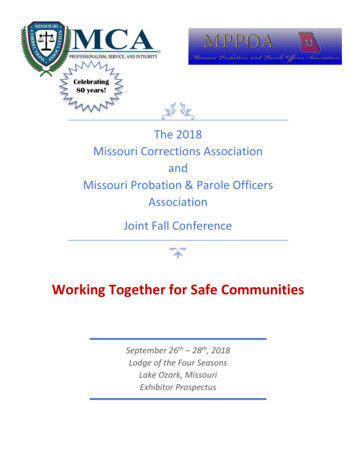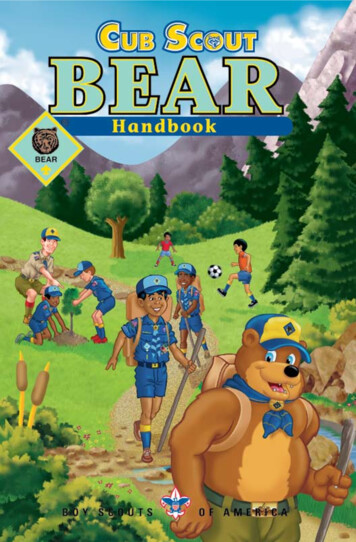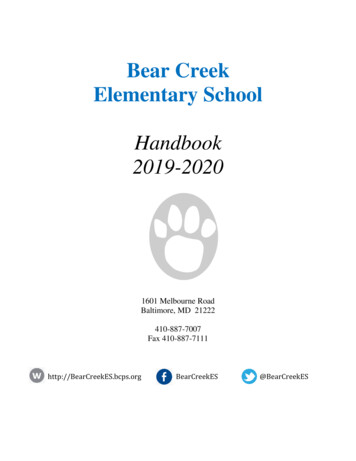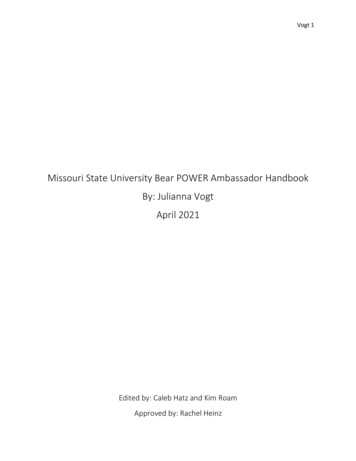
Transcription
Vogt 1Missouri State University Bear POWER Ambassador HandbookBy: Julianna VogtApril 2021Edited by: Caleb Hatz and Kim RoamApproved by: Rachel Heinz
Vogt 2Table of ContentsUnit 1: For Your Knowledge/Getting StartedSection 1: Goal and Objective of Bear POWER . 4-Quotes from Current AmbassadorsSection 2: Qualities that make a great ambassador . 5Section 3: Benefits of committing to being a Bear POWER Ambassador . 5Section 4: Expectations of Ambassadors, Appropriate/Inappropriate Interactions .6Section 5: Student Diagnosis . 7-Autism Spectrum Disorder-Down’s Syndrome-Attention-Deficit/Hyperactivity DisorderSection 6: Increasing Inclusion . 9-Ways that ambassadors can advocate for inclusion on campus-Ways ambassadors can encourage Bear POWER students to pursue membershipsin clubs and organizationsUnit 2: Ambassador and Student InteractionsSection 7: Positive Interactions with Students . 10-Body LanguageSection 8: How to Balance your Time with Student Time . 11-Healthy BoundariesSection 9: How to help Students Problem Solve using a Positive Attitude . .11Unit 3: Encouraging Student IndependencySection 10: Different Levels of Independency .12-Least Restrictive EnvironmentSection 11: Student Interdependent Life/Utilizing Campus Resources . .12-Disability Resource Center-Bear CLAW-The Career Center-Counseling Center-Bear Line-Safe WalkSection 12: Student Choices, Free Will, and Natural Consequences . 15-Various ExamplesUnit 4: Student SupportSection 13: Student Advocacy . 16-Examples of Role Play Situations for Student Practice and UnderstandingSection 14: Academic Support .17-Credit vs. Audit-Assisting students in organizing schedules-Mock Student ScheduleSection 15: Social Support/Community Engagement . 19-Campus ActivitiesSection 16: Health/Wellness Support . 20-Mental Health Management
Vogt 3-Coping StrategiesSection 17: Navigating hard/hot Topics with Students 23-Professional Development OpportunitiesUnit 5: Chain of Command/Ambassador and Student SupportSection 18: Communication when Problem Solving . 24Section 19: Staff Contact Information and Roles . 25-Rachel Heinz-Caleb J. Hatz-Kim J. Roam-Angie Sachese-Sophia P. McDonald-Kasey HoelscherSection 20: Role of Lead Ambassadors 29Section 21: Emergency Situations . 29Works Cited . .31
Vogt 4Unit 1: For Your Knowledge/Getting StartedSection 1: Goal and Objective of Bear POWERFrom tmThe Bear POWER program:Bear POWER is a five-semester inclusive college program for individuals with intellectualand developmental disabilities. POWER stands for Promoting Opportunities for Work,Education, and Resilience. A four-year program will be implemented Fall 2022.Bear POWER Goal:To provide students with intellectual and developmental disabilities seek a transitionperiod of occupational-specific training to find meaningful, competitive, and inclusivecareers. Bear POWER does this through post-secondary educational classes, internships,college experiences, and life skills.Bear POWER Objective:The number one objective of Bear POWER is for students to secure a job after graduationfrom the program. Secondary objectives of the program include life skills, independence,social skills, and authentic college experience through inclusion on Missouri State’scampus.Bear POWER Ambassadors:Bear POWER ambassadors are peers and role models for the Bear POWER students. Theyare high achieving students at Missouri State and are genuine friends and mentors to thestudents. Ambassadors spend 3-4 hours a week with their specific student in order toprovide support. Ambassadors are vital to student progress and success.Ambassador Role in Achieving Bear POWER Goals:Ambassadors assist and encourage students in academic goals, social skills andinteractions, and independent living.Q: When did the first cohort of Bear POWER start on Missouri State’s Campus?R: The first cohort started on campus in the semester of Spring 2019.
Vogt 5Section 2: Qualities that make a great ambassadorAmbassadors are held to high standards as role models for students. These are somehelpful qualities that current ambassadors have said are important to have to bestsupport Bear POWER students:“I think flexibility and patience are super important. Much like we all have bad days,recognizing your student isn’t perfect and being flexible to their needs always goes a longway!! :)” - Avery Brooks“Some qualities of a good ambassador are just being understanding, empathetic,encouraging, supportive, and show up and always be there for your student wheneverthey need it. I also think it is important to put their mental health first and if there’s atime where they need a break, let them have it. Make sure their needs and opinions areheard and matter.”- Nicole Nelson“I think patience and the willingness to go out of your way are the two most importantqualities.”- Michael Claunch“I would say someone who is patient, kind, caring, someone with time to put in, andreally just someone who wants to make a friend! Also, someone who is approachable,someone who’s problem solving, and someone who is passionate about helping studentsin bear power.” - Alyssa Freeman“Dedicated, good time management skills, intentional, compassionate, and inclusive.” Rachel Miller“I think that one important quality of an ambassador is selflessness! Being willing to putsomeone else above your self is very important when setting time aside to spend withyour student.”- Avery LingenfelserThese qualities are things that we look for in Missouri State students to recruit asAmbassadors. However, it is not required that each ambassador have every single one ofthese qualities. Ambassadors grow alongside their students.Section 3: Benefits of committing to being a Bear POWERAmbassador University service hours A genuine friend Contribute to inclusivity on Missouri State’s campus Mentors in lead ambassadors, graduate assistants, and Bear POWER staff
Vogt 6 Can lead to positions such as Lead Ambassador or Graduate Assistant Gain a sense of accomplishment through helping others Experience mentoring students with intellectual and developmental disabilities Volunteer experience to add to resumeQ: How do I log my hours in order to receive credit for them for myscholarship/fraternity/sorority/graduate school program?R: This is logged on Campus Link or via excel spreadsheet and then approved by BearPOWER staff.Section 4: Expectations of Ambassadors,Appropriate/Inappropriate InteractionsExpectations of Ambassadors:According to the Constitution of Bear POWER Ambassadors under Article 2 Section 2: MemberQualifications: “Ambassadors must be students at Missouri State University and be in good academicstanding (2.5 GPA or higher) Attend an ambassador training Meet with assigned Bear POWER student at least 2 hours a week or more Attend 70% of all Bear POWER Ambassador meetings and 50% of Bear POWERAmbassador events” (Greer, 2017)Q: Why are Bear POWER Ambassador meetings important?R: Communication with all ambassadors and staff is extremely important in order to bestsupport your student. Things are constantly changing and being adapted, so staying updatedis very important. This is also a time for you to have a meeting with your circle-of-support foryour specific student to talk about the positives and challenges that your student hasexperienced in the previous month.Expectations of Ambassadors Continued:According to the Bear POWER Ambassador Information and Agreement Form Be truthful to your student and staff
Vogt 7 Be kind to your student regardless of their behavior Follow the “golden rule” treat your students as you would like to be treated Communicate promptly to your Bear POWER student, other ambassadors, and staff Arrive on time to scheduled meetings with your Bear POWER student If you need to cancel a meeting with your Bear POWER student, communicate promptly “Lead by example; for many Bear POWER students, you will be one of the first peoplethey know at MSU and one of the first major aspects of their college experience. Makesure you are conducting yourself in a way that you would be proud to see your menteeconducting themselves **this includes on-campus and social media.” (Cayton & Roam,2019) Positively encourage your student to grow and try new experiences “Presume competence; you are there to help your Bear POWER student along theirjourney but as a friend. You are not their boss, their teacher, or their parent.” (Cayton &Roam, 2019) Do not violate the Code of Student Rights, Responsibilities, and Conduct. Violating thesewould be reported to the MSU Office of Student Conduct. No drugs or alcohol at Bear POWER events or when you are with any Bear POWERstudent “Mentors and mentees are not to pursue romantic relationships with one another. Notonly is this inappropriate of a mentor, but it also violates Title IX, and would be reportedto the MSU Title IX Office.” (Cayton & Roam, 2019) Check-in bi-weekly with the lead ambassadorSection 5: Student DiagnosisIntellectual and Developmental Disability Diagnosis and Bear POWER: Bear POWER does not require Bear POWER students to tell ambassadors, leadambassadors, graduate assistants, or staff their diagnosis. The reason for this is topreserve the dignity and respect of the students’ decision to disclose or not to disclosetheir private information. Students may want to disclose their diagnosis to their ambassadors, if this is the case,ambassadors must keep this information confidential.
Vogt 8 Bear POWER focuses on abilities rather than disabilities.General Descriptions of Various Intellectual and Developmental Diagnosis:These descriptions are general and meant to give ambassadors with less experience ageneral idea of what to expect before meeting students. It is important to keep in mindthat not all disabilities are experienced in the same way, all students are different andthat should be appreciated. A broad diagnosis does not mean that they will experienceevery symptom. From the Mayo Clinic t-adhd/symptoms-causes/syc-20350878 Autism Spectrum Disorder:“Impacts how a person perceives and socializes with others.” (Mayo Clinic 2021)Possible Symptoms: repetitive actions, reduced eye contact, underdeveloped languageskills, difficulty learning, difficulty adjusting to new or familiar social situations, needingless or more sensory input, misinterpretation of people’s feelings and actions.Possible Positive Attributes: Passionate about specific interests, enjoy daily routines, andempathetic. Down’s Syndrome:“Genetic disorder caused when abnormal cell division results in an extra full or partialcopy of chromosome 21.” (Mayo Clinic 2021)Possible Symptoms: Cognitive impairment, delayed language, and memory issues.Possible Positive Attributes: Physical flexibility, strong attachments with friends andfamily, and empathy for others. Attention-Deficit/Hyperactivity Disorder:“Mental health disorder that includes a combination of persistent problems, such asdifficulty paying attention, hyperactivity and impulsive behavior.” (Mayo Clinic 2021)Possible Symptoms: Disorganization, restlessness, and difficulty regulating emotions.Possible Positive Attributes: Outside-of-the-box thinkers, reacting quickly, and energetic.
Vogt 9Section 6: Increasing InclusionA goal of Bear POWER is for students to be immersed into Missouri State’s community in orderto achieve inclusion on campus. Part of the ambassador role is advocating for inclusion oncampus and encouraging Bear POWER students to pursue memberships in clubs, organizations,and attend events on campus.Ways that ambassadors can advocate for inclusion on campus: Sharing the objective and goals of Bear POWER with Missouri State clubs andorganizations. Attend Missouri State clubs and organizations with Bear POWER students. If problems arise, communicate, and help Missouri State clubs and organizations problemsolve on matters concerning inclusionWays ambassadors can encourage Bear POWER students to pursue memberships in clubs andorganizations: Learn about the hobbies and interests of the students Help them find clubs and organizations that fit their hobbies and interests throughCampus Link and encourage them to attend a meeting or two to see if they enjoy any ofthe clubsCampus Link Website: zations Keep in mind that not all clubs or organizations are going to fit your student, it mighttake several tries with different groups in order to help your student find one that theywant to commit toQ: Why is inclusion important for the students?R: Inclusion on campus helps students grow and be a part of the Missouri State campuscommunity. It is important for them to get the full college experience similar to any other collegestudent.
Vogt 10Unit 2: Ambassador and Student InteractionsSection 7: Positive Interactions with StudentsWhile interacting with Bear POWER students, it is important to maintain positive interactions inorder to be genuine friends and trusted mentors. Ways to have positive interactions include: Be excited to see your student and meet with them. Compliment students and notice accomplishments. Believe in your student’s abilities. Reassure and look for positives in difficult situations. Offer assistance without making them feel like they are a burden. Be present and attentive while meeting with them. When discussing problems, focus on the future and what can be done in order to fix theproblem or prevent it from happening again rather than focusing on mistakes. Be interested in the hobbies and interests of the students. Presume competence of your student. While meeting with your student, be mindful of your body language and non-verbalcommunication. Examples of negative non-verbal communication include:-Folded arms-Sighing-Leaning back-Yawning frequently-Lack of facial expression-Not maintaining eye contact-Furrowed eyebrows-Checking phone frequently-Harsh tone of voice
Vogt 11Section 8: How to Balance your Time with Student TimeStudents and Ambassadors form a trusting friendship; however, ambassadors must keep in mindbalancing their personal time with student time.Healthy Boundaries: Students and Ambassadors should agree to not text each other after an agreed upontime unless there is an emergency. For example: After 9 pm, they will wait until the nextmorning to contact each other. Students and Ambassadors should agree on the frequency of contacting each other. Thiswill be different for each student circle of support. Help students to learn to manage their time. It is ok to not help a student. If students have assignments that they need help with, they need to ask for help wellbefore the due date, not the night of. If this occurs, ambassadors need to remind studentsto be respectful of their time and they may not be able to help on short notice. Ambassadors agree to communicate in a respectful way when boundaries concerningtime management are crossed, and everyone needs to be held accountable.Q: Why is balancing personal time with student time important? What if ambassadors don’tmind?R: Ambassadors are students as well, and continued misuse of their time can lead to inevitableburnout. It is also important for the students to learn the life skill of healthy boundaries.Section 9: How to help Students Problem Solve using a PositiveAttitudeWhile transitioning to college, dealing with change, learning to be independent, makingmistakes, and acclimating to the stresses of classes, students may become overwhelmed.Ambassadors can help by doing these things: Stay Calm Be empathetic in their experiences Encourage students to use healthy coping strategies (page 21) Attentively listening Offer to help
Vogt 12 Encourage students of their abilities and strengths Talk about what can be done the next time the situation comes up. Focus on what can befixed, not what can’t Contact Bear POWER Lead Ambassador or Bear POWER staff if an issue cannot beresolved and/or it is a large issueUnit 3: Encouraging Student IndependencySection 10: Different Levels of IndependencyAll students have different levels of abilities. Some students require very little support, whileothers require more. As ambassadors, it is essential to support them without stifling theirindependence. By doing this, we provide them with a Least Restrictive Environment.“Least Restrictive Environment (LRE) is the requirement in federal law that students withdisabilities receive their education, to the maximum extent appropriate, withnondisabled peers and that special education students are not removed from regularclasses unless, even with supplemental aids and services, education in regular classescannot be achieved satisfactorily.” (Special Education Rights and Responsibilities Manual2021)In order to provide appropriate support, as described in the Special Education Rights andResponsibilities Manual, ambassadors must respond to student needs with support rather thantaking over and doing tasks for them. Ambassadors are tools that the students utilize, they arenot caretakers. Expectations for students are dependent on the student’s abilities, needs,situation, and goals.In addition to the level of support, the type of support also varies. Some students might needsolely academic support and be independent socially, others might be the opposite or need helpwith both. Encourage students to be independent in the areas that they are able.Section 11: Student Interdependent Life/Utilizing CampusResourcesAmbassadors are not the only resources for students. Encourage students to utilize MSU campusresources such as: Disability Resource Center:“Through innovative consultation and collaboration, the Disability Resource Center leads thecampus community in its commitments to recognize disability as a valued aspect of diversity,embrace access as a matter of social justice, and design more welcoming and inclusiveenvironments.” (State, M., Center, D., & Resources, C. 2021)
Vogt 13Contact Information:Meyer Library, Suite 111417-836-4192DRC@MissouriState.eduAbout this resource: This resource is very commonly used by students. When students are takingtheir courses for credit, they can go to this clinic to receive accommodations such as extra time,a quiet place, or other necessary accommodations during quizzes and tests. Students make ameeting with an advisor from the clinic at the start of each semester where they discuss theirneeded accommodations, then they receive a letter that they give to their instructor to receivethe accommodations that the clinic advisor and student have agreed-upon. This does not requirestudents to tell instructors their diagnosis as that is kept confidential. Once instructors are giventhis letter, they legally must provide these accommodations. “Bear CLAW (Center for Learning and Writing):“The Bear CLAW is a new interactive space on the first floor of Meyer Library that unites theresources and expertise of the faculty, library personnel, computer and information technology,the Writing Center, subject-area tutoring, and supplemental instruction in an environment thatfosters informal, collaborative work, and social interaction.” (State, M., Center, D., & Resources,C. 2021)Contact Information:Dr. Diana Garland113 Meyer LibraryTelephone: ut this resource: This resource is commonly used by students. It is a free resource, and it isvery valuable. Ambassadors can support students academically, however, if a student needsspecific support that the ambassador does not have the knowledge for, they can direct studentsto this resource. The student tutors are helpful and familiar with almost all course content forgeneral education courses. The Career Center:“The mission of the Career Center is to provide professional assistance and intervention toMissouri State students and alumni through the use of career counseling, internship and fulltime job searches, and vocational and educational information, so they may make insightfulcareer decisions.” (State, M., Center, D., & Resources, C. 2021)Contact Information:Carrington Hall 309 / Glass Hall 276417-836-5636CareerCenter@MissouriState.eduAbout this resource: This resource can be helpful for students to learn about different careersand find one that they enjoy and have a passion for. The goal of Bear POWER is to help thestudents find meaningful careers, and this resource is very helpful for that.
Vogt 14 Counseling Center:“The primary goal of the Counseling Center is to promote students' development andpsychological well-being. Services are provided for individuals with personal-social concerns andlife-planning issues. Experienced professional counselors, psychologists, social workers, andgraduate students assist clients in resolving conflicts which may interfere with their progress atthe University.” (State, M., Center, D., & Resources, C. 2021)Contact Information:Magers Health and Wellness Center, Suite bout this resource: This resource is very important for student wellbeing. Going to see acounselor might be scary at first, however, it can make a world of difference. Ambassadors canlisten and help students, however, they are not trained to be professional counselors, nor shouldthey attempt to do this. Ambassadors can encourage going to this resource by helping studentsmake an appointment, maintaining confidentiality of the situation except and even going withtheir student to the appointment and sitting in the waiting room to show support. “Transportation - Missouri State provides shuttle services on campus. All shuttles are equippedwith wheelchair lifts. Detailed information regarding the shuttle service is available from theDepartment of Transportation Services.” (State, M., Center, D., & Resources, C. 2021)Routes and maps can be found arLine/weekday-routes.htmAbout this resource: Not all students drive, and with the Bear Line, students can be independentwithout needing to drive. All Bear Line drivers are kind and care about student safety.Ambassadors can support this independent task by helping students plan their routes ahead oftime. To urge students to travel campus safely, remind them of this resource often. If studentsget confused about their route while on the Bear Line, the drivers are happy to offer assistanceand get them to where they need to go. Safe Walk“24/7 on-campus walking service. If students feel unsafe at any time, they can call and beescorted to their destination by a campus safety specialist. This does not replace othertransportation, it is for emergencies and unsafe situations.” (State, M., Center, D., & Resources,C. 2021)Contact Information:417-836-5509About this resource: This resource number should be in each student’s phone contacts. Studentsshould utilize this resource to increase security and safety. Make sure that students do not abusethis resource and only use it when needed.Campus resources Link: sources.htm
Vogt 15Section 12: Student Choices, Free Will, and NaturalConsequencesStudents have the right to make their own choices and make mistakes. Ambassadors providetools, support, resources, and direction, but students must take ownership of their decisions.Q: Why do we have to allow students to make mistakes? Isn’t that hard on them?R: Bear POWER prepares students for real life. When they are held accountable for theirmistakes in a controlled environment, they learn how to deal with mistakes independently later.Example 1:Ambassador encourages student to start a large project early so that they have time tofinish it. Student does not want to start the project and later struggles to finish it beforethe due date. Because the work is rushed the student receives a lower grade.In this scenario, the student choice was to not start the large project early, the free willwas that the ambassador allowed them to make this decision against their advice, andthe natural consequence was that the student received a lower grade.Example 2:Ambassador advises student to eat a balanced meal in the dining hall. The student goesto the dessert counter and makes a plate of sweets only. The ambassador does not stopthem but encourages them to go back once they are done to get food that will makethem feel full and healthy. The student chooses to only eat sweets, and later that nighthas a stomachache.In this scenario, the student’s choice was to only eat sweets, the free will was that theambassador allows them to make this decision, and the natural consequence was that thestudent had a stomachache later that evening.Example 3:Ambassador promotes the student to find a student organization that they enjoy.Student agrees and picks a group that shares an interest with them. Ambassador attendsthe first meeting with the student, and then the student starts to attend this organizationon their own. They meet friends and grow even more passionate about their intereststhrough their new group.In this scenario, the student choice was to pick a student organization to join. The freewill was that the ambassador presented this as an option. The natural consequence waspositive in that the student gained new friends and had fun.
Vogt 16Unit 4: Student SupportSection 13: Student AdvocacyPart of being independent requires the students to advocate (stand up) for themselves.Ambassadors and Bear POWER staff advocate for them as well, however, the goal is that theyare able to do it for themselves as well. Lamar University wrote an article titled “EmpowerSpecial Education Students Through Self-Advocacy” that succinctly states this.“Self-advocacy is a person’s ability to effectively communicate and asserthis or her needs. It is an effective tool, and people who self-advocate aremore likely to experience success at work, at school, and throughout theirlives. Teaching self-advocacy to special education students is especiallyimportant as they transition to post-secondary education and acompetitive job market. Teaching special education students how to takecharge of their education and their lives can help them be more successfulas they exercise their independence.” (Empowering Special EducationStudents Through Self-Advocacy 2016)Link: cy/How can ambassadors promote student advocacy? Brainstorm problem-solving strategies together Assure them of their rights Affirm their needs (especially accommodations for their disability) and wants are valid Guide them when needed in identifying social cues, encourage them to notice themon their own as well Let them ask for help, don’t just jump in all the time Prepare them for situations in which they may need to advocate for themselvesthrough role-play“Teaching special education students how to handle different situations isa good way to prepare them for situations that may arise as they strive tobecome more independent.” (Empowering Special Education StudentsThrough Self-Advocacy 2016)
Vogt 17Example of Role Play to Increase Self-Advocacy:Student plays the role of themselves and ambassador plays the role of an instructorwith whom the student has a dispute about their disability accommodations.Instructor (ambassador): I see that you submitted your accommodation letter,but I don’t think it is fair that you get to take your test in the testing centerinstead of the lecture hall like the rest of the students. What is your disabilityanyways?Student: The Disability Resource Center advisor and I have agreed that due tomy disability, I require a quiet place to take my test. I appreciate your concernfor my disability; however, my diagnosis is personal, and I do not wish to tellyou.Instructor (ambassador): It is quiet enough in the lecture hall; I make sure noone is talking, and phones are off.Student: Yes, but there is still noise that is distracting to me such as peoplemoving around, walking around, clicking pens, or tapping their feet. I will betaking tests in the testing center where it will be quiet, and I can focus.Instructor (ambassador): I must let you?Student: Yes. Thank you.The student in this role-play example knows their rights and stands up for themselvesand their needs, this is perfect self-advocacy.Section 14: Academic SupportCredit vs. AuditStudents can take their courses for audit or credit. This can be changed by theRegistrar’s office through the assistance of Bear POWER Staff.Courses for Credit:Students will receive university credit hours for their coursework. They mustcomplete all of the assignments, quizzes, tests, and projects that everyoneelse in the class completes. Their assignments are also graded the same as anyother student. If a student needs accommodation, they must go through thedisability resource center.
Vogt 18Courses for Audit:Students will not receive university credit hours for their coursework. BearPOWER staff adapts the class syllabus into a learning agreement for thestudents. The adaptions are different for each students’ abilities and goals.Q: If my student is taking their course for audit, do their grades not matter?R: Their grades in their courses still matter, even if they are taking them for audit. They must stillpass their classes on the assignments that
careers. Bear POWER does this through post-secondary educational classes, internships, college experiences, and life skills. Bear POWER Objective: The number one objective of Bear POWER is for students to secure a job after graduation from the program. Secondary obj

